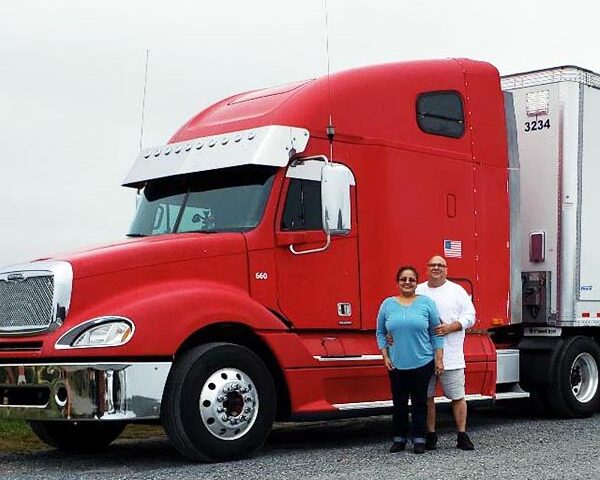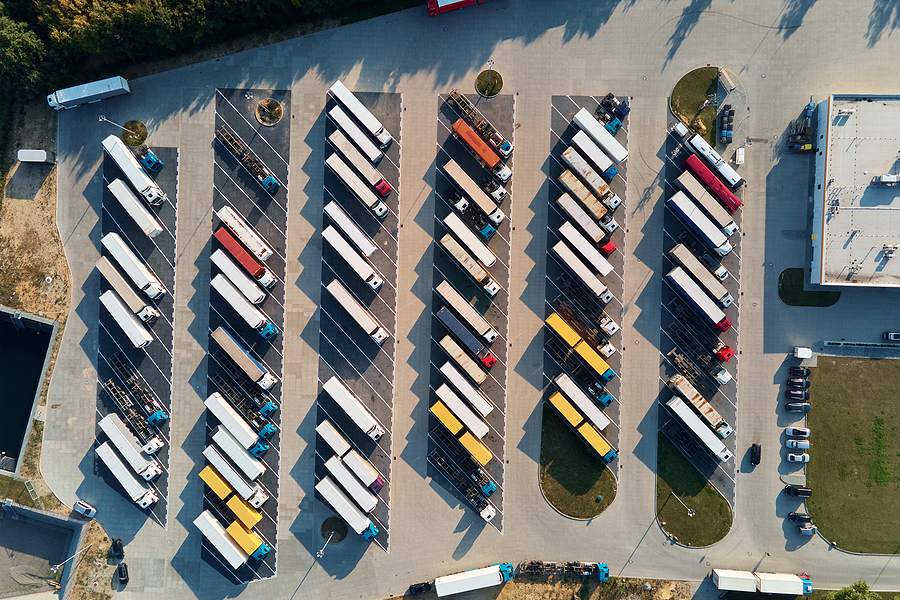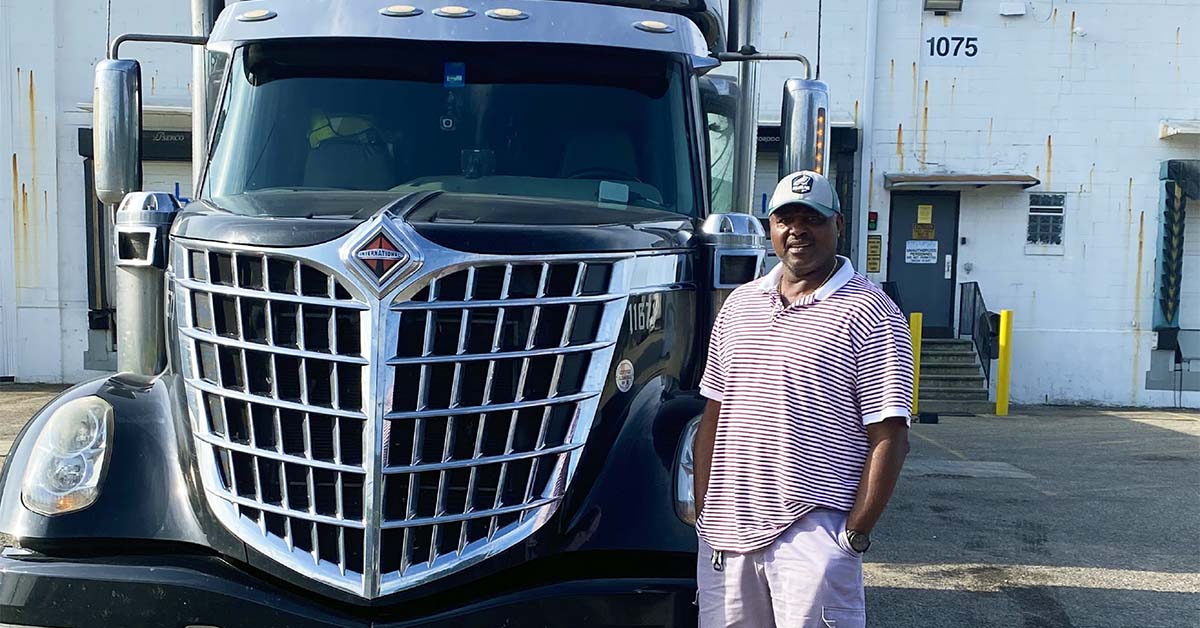
Owner Operator Stories: Steven Thomas
October 28, 2020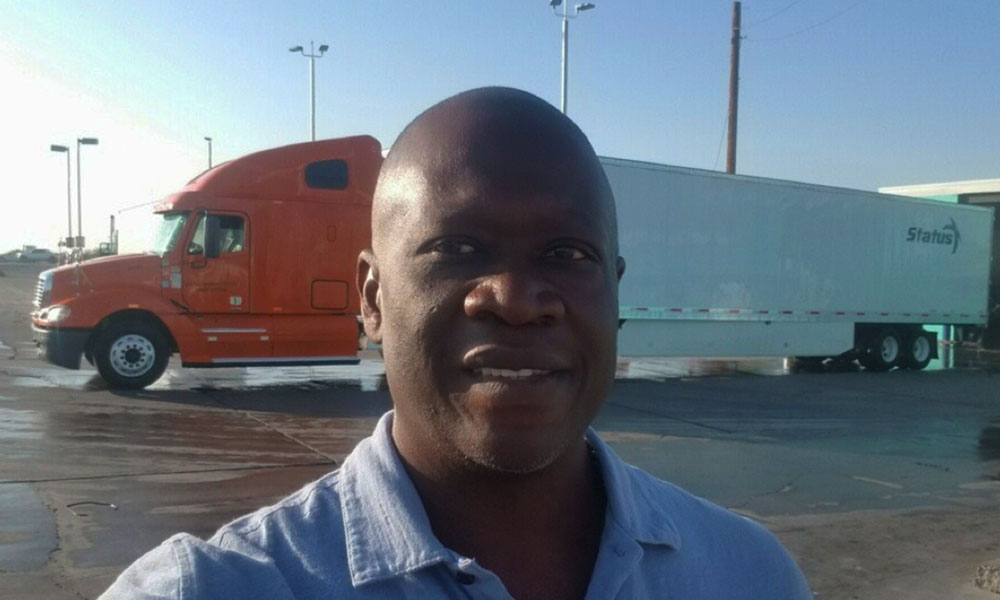
Owner Operator Stories: Ezequiel Jean
December 14, 2020Brent Gundaker has been an Owner Operator with Status Transportation since 2014 and has a good amount of experience in the trucking industry.
Today, we are happy to have the opportunity to talk with him about his life and career as an Owner Operator, and share his positive outlook about what it takes to succeed as in the industry when starting a trucking career. We always encourage newer drivers to learn from the wisdom and knowledge our seasoned Owner Operators share, which can help them prepare for the situations they may encounter early on while figuring out how to make money in trucking.
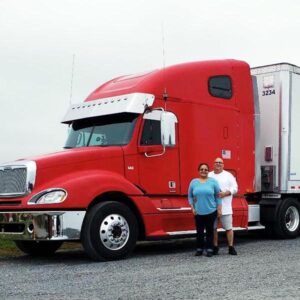 ST: Why did you decide to join the trucking industry?
ST: Why did you decide to join the trucking industry?
Brent: Starting a trucking career all started with a conversation with one of my wife’s cousins, who was a trucker and ran local loads. He loved trucking and I always shared how I would love to drive too. So one day, he asked me if I had ever considered getting my Class A license and start driving a truck. At that time, I said no, but it kept me thinking about “why not give it a shot?” My wife’s cousin was the one who told me where to rent the truck and how to get it set up, guiding me through the process—and I am very happy he did. Now I’m an Owner Operator working in dry van trucking, I love going to a different place and different state on a daily basis. Every day brings something new and it’s never boring. The roads and traffic patterns are different in every city. Every shipper and receiver are different—no two are the same. I am one of those people who gets bored very quickly, so being an Owner Operator and having different loads all the time while working with so many different people keeps it interesting. You can surely tell I enjoy it with the 30 years that I have been in the trucking industry now I’ve figured out how to make money in trucking.
ST: What year did you start driving semis?
Brent: I started driving back in 1990, making 2020 my 30th anniversary of starting a trucking career.
ST: What has kept you in the industry all this time?
Brent: I love being self-employed and managing my own business as an Owner Operator, since it has shown me how to make money in trucking. It gives me the chance to take time off when I want to be with my family. That’s what I really love about starting a trucking career—it’s never boring and today’s technology has also made it a lot easier than when I first started out.
ST: What did you do for work before joining the trucking industry?
Brent: I was a cabinet maker at Crafts Cabinets in Chatsworth, California.
ST: In your opinion, what is the most important thing that leads to success in this industry as an Owner Operator?
Brent: Having a good, reputable trucking company like yours—a dry van trucking company that is honest with their settlements, has good dispatchers to find you good loads and is a reliable source of honest income. There are a lot of companies out there that will tell the Owner Operator that the load pays $4,500 and you’ll be paid that amount, but in reality, that company made $2,000 more on top of that load. It’s very hard to find a company that is 100 percent honest and organized with their Owner Operator settlements, so you know what money you made and what you spent on fuel. Status is very open and I like that—they don’t try to “befuddle you with the bologna” when it comes to how to make money in trucking.
ST: How long did it take for you to become comfortable on the road when you first started driving?
Brent: Honestly, it happened pretty quickly despite the fact I was starting out in Los Angeles. I was used to driving in a lot of traffic, although my previous experience was not in a tractor/trailer. For sure, it was a little bit of a learning curve since it takes time to adjust to the reality that your equipment is bigger than the others on the road. You just have to make sure you swerve out a little wider when making a turn. And when going down a road, you have to look as far ahead as you can, so you can plan ahead as much as possible. For me, it just came naturally and got pretty comfortable right away.
ST: What trucking school did you attend?
Brent: I did not attend a trucking school when starting a trucking career. What I did was study and take a written test. Then you just had to pass a driving test. Back in the day, it was something you could do. There was a company in Los Angeles that would rent you their truck and trailer to take the driving test. You would tell them what day you were taking the test and they would meet you down there with the truck and trailer. Then after your test, they would take the truck and trailer back with them.
ST: What was your first driving job?
Brent: My first job was with Newsend Dairies in Lancaster, California. We had just built a home there with my family. Back then it was very hard to get a driving job since everyone wanted at least one year of experience and of course, I didn’t have any experience at that point. It was a new company with a very small distribution center for dairy products. When I first got my license, I saw that they had a tractor trailer and it was a few miles away from the home I had just built. So, I decided to stop by and ask the owner if he needed help. I told him I had just got my CDL. He said to me: “during the week you’ll run the dairy truck and on Fridays you’ll drive the semi.” His son usually drove the semi during the week, so I got the semi shift once a week. But this way, I got a chance to start driving semis, even if it was only once a week.
ST: How did you decide to buy your own truck to get into dry van trucking and become an Owner Operator?
Brent: After about a year of working at the dairy company, I decided that I wanted to be an Owner Operator because my wife’s cousin, bought his own truck and started running dry van trucking containers. So, I made the decision to buy my first truck and went to work for another company. My first truck was a single axle tractor and it could not handle more than 20,000 lbs. on the back, so I could only take lighter loads. What I did first was run LTL freight and light loads all around Los Angeles. I did that for probably about a year before I bought a newer truck and started working the railroad yards out of Los Angeles. I had this new truck for about 3 years until my truck and trailer were stolen—and sadly, they were never recovered. That was rough since I had been working day-and-night. Luckily, insurance paid off the equipment and with a little money in the bank, I went back to work as a driver with Nestle Transportation out of Riverside, California. With them, I was hauling candy bars out of Nestle distribution centers. Later on, I moved to Florida and started working as a driver for UPS Freight in Orlando. After a while, I just got really tired of punching the clock every day, being told what time I had to come in, how many hours I had to work, and what time I could go home—so it was simply too much. I really wanted to go back to being an independent Owner Operator working for a reputable trucking company. I was doing over 20 stops per day in Orlando, running to the U.S. Post Office in five different cities and constantly struggling between pickups and deliveries, so it was very challenging. You had to move as fast as you could, but it would run you down. That said, I cannot complain because it paid well, but then again—it was just too much for me. I truly wanted to be independent, so I decided to become an Owner Operator again so I could make money in trucking.
ST: How do you maximize your profit?
Brent: I maximized my profit by paying off my truck so I could make money in trucking. As an Owner Operator, it really helps not having that truck payment haunt you through your career. This is my strategy for keeping a lot more of that revenue, which I believe to be the best way to maximize profits with dry van trucking. Another way is to always try to stay one step ahead of the game when it comes to repairs and maintenance. So, if you see that a repair may be needed soon, get ahead of it and take care of it right away.
ST: How do you prepare for equipment repairs now you’re an Owner Operator?
Brent: I have three shops that I use regularly, depending what kind of repair I need to do. My truck has a Caterpillar engine, so whenever I need an engine repair I go to my regular shop. Over time, I’ve built a relationship with them. My advice to any new Owner Operator is to develop a good relationship with your shop. Prepare yourself mentally that while the repair may not be cheap, it will certainly be done right. Anytime I see a repair coming up, I just call my shop about two weeks ahead of time to get it scheduled. I’ll set it up for a Monday morning and get there Sunday night. This way I know I’ll be the first one in on Monday morning. When it comes to dry van trucking, being there early helps you to get in right away. I do have a different shop just for tires, Colonial Tires in Rona. Additionally, there is a Freightliner dealership near my home where I go for anything else other than tires and engine repairs. It is important to establish a relationship with a shop that you can trust, so when you get there, you can be sure that they know what they’re doing—and you will also trust them to do a good job. Keep in mind that when it comes to regular maintenance as an Owner Operator, scheduling it with a shop that is reputable and with which you’ve already built a relationship can give you the best results.
ST: How long do you stay out on the road at a time? What regions do you run and why?
Brent: I normally stay out one week at a time, leaving on Monday and coming back home on Friday. At this point in my career, I run regional routes. If I happen to bring a load home with me, I leave Sunday night, go to the delivery location, park there for the night and deliver first thing in the morning. Being married for 36 years this November, I want to maintain this schedule. I want to be home for the weekend because I love my wife and I love my kids. I still have one daughter at home so I want to be home for them since family is very important to me. I love that Status accommodates for what is important in my life now I’m a dry van trucking Owner Operator.
ST: What tips can you give an Owner Operator when working with their dispatcher?
Brent: The best advice I can give to an Owner Operator is to have good communication with his or her dispatcher. What I do with every load, once I’ve arrived at the shipper, is to send my dispatcher a text message saying “Arrived”. Once I’m loaded, I’ll send him another text saying “Loaded and rolling”. Then I will check the load information, get an idea of when I’ll be delivering it and text the dispatcher my ETA. Once I’ve started unloading, I’ll send him another text saying “Unloading.” After I have finished unloading, I’ll send him a final text giving him an update. Best advice I can give is to constantly update your dispatcher, even if it is just a short update because it pays to keep them informed. My dispatcher, Justin, has been crucial to my current career success. Having a reputable trucking company with a dispatcher who will take into consideration your home time and looks out for your best interest is the secret to success. Just know a good dispatcher can make you—or break you.
ST: Since starting a trucking career, have you encountered any situations while being in the trucking industry that made you wiser or better as an Owner Operator?
Brent: Over the course of 30 years there have been many, of course. I first learned that it is important to gain good driving experience when starting a trucking career. When you have more experience driving, you develop more patience with other trucks and cars on the road. It is also important to have patience with the broker and the dispatcher. Sometimes things get very challenging, so it is important to just take a deep breath and do things safely. Always review your route, figure out where you’re going and choose the safest route to get there. For dry van trucking, it is better to stay on the US highways. While it may make your route a little longer, ultimately it will be safer this way. In essence, an Owner Operator must choose safety over a few minutes saved.
ST: What was your most memorable experience on the road?
Brent: My most memorable experience was when my wife went out on the road with me last year—which was a lot of fun because of the good time we had together. Just being together, spending time together, trucking down the road, and making money together is a big reward for an Owner Operator. To this day being with her is the best way to spend my time and still getting to work. It can be a challenge to be away from home, but I realize that in this industry we are in and it is what we have to do to make really good money. There are sacrifices to be made as an Owner Operator, but when we are together—going to many different states together—it is all worth it.
ST: What advice would you give to someone who wants to become an Owner Operator for the first time?
Brent: Don’t go into debt for a new truck, which are usually $100,000-$115,000, before figuring out how to make money in trucking. My advice for a new Owner Operator is to not buy a new one unless you can buy it cash. Older trucks are still very good and I would suggest to either put a big down payment to lower your payments or pay it in full to have no payments at all. When you buy a truck for dry van trucking, make sure all maintenance has been done and that you have enough repair funds for at least the next six months. Also, an Owner Operator must keep trucking money separate from personal money. Don’t use your trucking money for personal items—only take what you need to pay yourself to survive out of your trucking account. A lot of Owner Operators I know say they’re making a lot of money, but they’re not really making a profit. All that money is actually your business money and it should be set aside for the major truck upkeep and maintenance that will certainly come up at some point, so keep your accounts separate. Be prepared for what might go wrong and have the cash on-hand to cover these big-ticket items.
ST: What do you wish someone would have told you when you first started as a driver?
Brent: When I was starting a trucking career, I wish someone had told me how hard it was to find a reputable trucking company like Status. It was very difficult to find a good company—an honest company—with nice people and great dispatchers. I also wish someone would had told me where to go to buy my first truck, so I could make the most out of my money and have a good company to get started in the dry van trucking business.
ST: What do you wish someone would have told you when you first started as an Owner Operator?
Brent: As I said before, I wish someone would have recommended a reputable trucking company to work for early on. That would have saved me a lot of struggles as an Owner Operator in dry van trucking. Other than that, I pretty much knew what I was getting into when I was starting a trucking career.
ST: In your opinion, what would be the main thing that all new drivers should know about how to make money in trucking?
Brent: Always look ahead and plan ahead when you’re driving. Have patience for everyone else on the road. As Owner Operators, we make mistakes too, so have the patience for yourself. Sometimes you go down a road and then you see that you shouldn’t have come down this road. Accept that we all make mistakes—and always be safe, because in the long term that’s the only thing that matters in dry van trucking.


